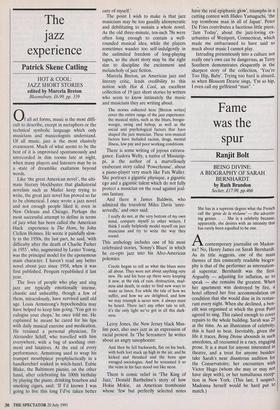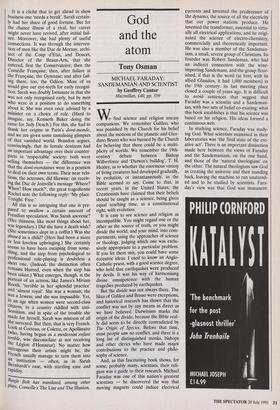Fame was the spur
Ranjit Bolt
BEING DIVINE: A BIOGRAPHY OF SARAH BERNHARDT by Ruth Brandon Secker, f17.99, pp.466 She has in a supreme degree what the French call the 'genie de la reclame' — the advertis- ing genius. . . . She is a celebrity because, apparently, she desires with an intensity that has rarely been equalled to be one.
Acontemporary journalist on Madon- na? No, Henry James on Sarah Bernhardt. As its title suggests, one of the main themes of this eminently readable biogra- phy is that of the performer as internation- al superstar. Bernhardt was the first. Arguably — adjusting for inflation, so to speak — she remains the greatest. When her apartment was destroyed by fire, a hotel offered her free accommodation on condition that she would dine in its restau- rant every night. When she declined, a ben- efit was organised at which the great Patti agreed to sing. This raised enough to cover repairs to the whole building. Sarah was 25 at the time. As an illustration of celebrity, this is hard to beat. Inevitably, given the life it traces, Being Divine abounds in such anecdotes, all recounted in a racy, engaging prose. It is a must for anyone interested in theatre, and a treat for anyone besides: take Sarah's near disastrous audition for the Conservatoire; her encounters with Victor Hugo (whom she may or may not have slept with); or her tumultuous recep- tion in New York. (This last, I suspect, Madonna herself would be hard put to match.) It is a cliché that to get ahead in show business one 'needs a break'. Sarah certain- ly had her share of good fortune. But for the chance illness of a rival, her career might never have revived, after initial fail- ure. Moreover, she had plenty of useful connections. It was through the interven- tion of men like the Duc de Mornay, archi- tect of the Coup d'Etat, and Doucet, Director of the Beaux-Arts, that she entered, first the Conservatoire; then the Comedie Frangaise; then, after failure at the Francaise, the Gymnase; and after fail- ing there, too, the Odeon. Most of us would give our eye-teeth for early recogni- tion. Sarah was doubly fortunate in that she was not only recognised early, but by men who were in a position to do something about it. She was even once advised by a minister on a choice of role. (Hard to Imagine, say, Kenneth Baker doing the same for Judy Dench.) For this, she had to thank her origins in Paris's demi-monde, and we are given some tantalising glimpses of that vanished world. Brandon argues, Convincingly, that its female denizens had an important advantage over their counter- parts in 'respectable' society: both were selling themselves — the difference was that the demi-mondaines were in a position to deal on their own terms. Their near rela- tions, the actresses, did likewise: on receiv- ing the Duc de Joinville's message 'Where? When? How much?', the great tragedienne Rachel sent the following reply: 'My place. Tonight. Free.'
All this is so intriguing that one is pre- pared to swallow a certain amount of Freudian speculation. Was Sarah anorexic? (Her thinness, like most things about her, was legendary.) Did she have a death wish? (She sometimes slept in a coffin.) Was she abused as a child? (Hers had been a more or less loveless upbringing.) She certainly seems to have been escaping from some- thing, and the step from psychological to professional role-playing is doubtless a short one. (Indeed, the distinction often remains blurred, even when the step has been taken.) What emerges, though, is the Portrait of an actress, like James's Miriam Rooth, 'terrible in her splendid practice' and 'almost royal'. She was a woman; she was a Jewess; and she was impossible. Yet, in an age when women were second-class
citizens, in a country riddled with anti- Semitism, and in spite of the trouble she made for herself, Sarah was mistress of all she surveyed. But then, that is very French. Look at Cocteau, or Colette, or Apollinaire (who, having begun as a modernist enfant terrible, was disconsolate at not receiving the Legion d'Honneur). No matter how outrageous their artists might be, the French usually manage to turn them into an Institution — often, as in Sarah Bernhardt's case, with startling ease and rapidity.
&rnjit Bolt has translated, among other PlaYs, Corneille 's The Liar and The Illusion.



















































 Previous page
Previous page